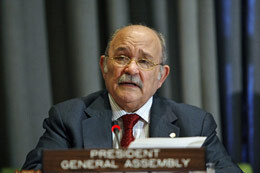The Electronic Intifada 16 December 2008

Father Miguel d’Escoto Brockmann (Paulo Filgueiras/UN Photo)
Enrique Yeves, spokesperson for the president, told reporters Monday there were “very serious threats” on the Internet against d’Escoto’s life and the matter is being looked into both by the UN security services and law enforcement officials in the United States.
The threats may have been triggered by widespread media reports — described as false — that d’Escoto tried to prevent Israel’s representative from speaking on the occasion of the 60th anniversary of the Universal Declaration of Human Rights early this month.
“This is a malicious and absolute lie,” Yeves said, pointing out that the news stories had appeared in several Israeli newspapers last week.
The story that he tried to prevent Israel’s representative from speaking “could best be characterized as slander and in any court of law this is a criminal act,” he added.
The love-hate relationship between the UN and Israel has been compounded further by Israel’s refusal to permit UN Special Rapporteur Richard Falk to visit the occupied territories currently under siege.
Falk was denied entry to Israel when he arrived at Tel Aviv airport Monday with staff members from the UN Office of the High Commissioner for Human Rights (OHCHR). He was on an official visit to carry out the mandate entrusted to him by the Human Rights Council.
His mandate included an investigation of human rights violations of the civilian population of Gaza, the West Bank and East Jerusalem, the territories occupied by Israel since 1967.
Falk was also planning to investigate “the rising humanitarian crisis in the Gaza Strip resulting from the siege of Gaza’s 1.5 million population imposed by the occupying power.”
According to the UN, Falk was held almost incommunicado for at least 30 hours before he flew back to New York.
D’Escoto said Israel’s detention and denial of entry to Falk “reflects a dangerous decision by individual countries to rebuff UN mandates and UN-appointed mandate holders.”
Yeves said the two actions concerning Israel — the media attack on d’Escoto and denial of entry to Falk — “are not helpful or conducive for the climate of international harmony” that d’Escoto is trying to promote.
D’Escoto has consistently maintained that the 192-member General Assembly should always remain “inclusive,” not “exclusive.”
Last month he criticized a move by the US to host an international conference on the global financial crisis because the White House confined the meeting to the G20 countries.
He said the conference should have included all of the members of the General Assembly (“the G192”), not just 20 countries.
The members of the G20 are Argentina, Australia, Brazil, Britain, Canada, China, France, Germany, India, Indonesia, Italy, Japan, Mexico, Russia, Saudi Arabia, South Africa, South Korea, Turkey and the United States. The European Union is also a member, represented by the rotating Council presidency and the European Central Bank.
When he started his presidency in mid-September, d’Escoto said one of his top priorities would be “the democratization of the United Nations.”
He will also hold three high-level meetings: one to review the international financial institutions, including the World Bank and the International Monetary Fund (IMF); the second on the revitalization of the General Assembly; and the third on reform of the Security Council.
Meanwhile, the Israelis also seemed unhappy that d’Escoto launched an attack on Israel last month when he told delegates that that it has been 60 years since some 800,000 Palestinians were driven out of their homes and property, becoming refugees and an uprooted and marginalized people.
The General Assembly, 61 years ago, adopted a historic resolution (181), calling for the creation of a Jewish State and an Arab State, he said.
“The State of Israel, founded a year later in 1948, celebrates 60 years of its existence,” d’Escoto said, “Shamefully, there is still no Palestinian State to celebrate.”
“What is being done to the Palestinian people seems to me to be a version of the hideous policy of apartheid,” he told delegates during a General Assembly meeting commemorating the “International Day of Solidarity with the Palestinian People.”
The New York-based Jewish Council for Public Affairs (JCPA) condemned the General Assembly for commemorating Palestine Solidarity Day and “deplored” D’Escoto’s remarks on apartheid.
The Assembly president also blasted the heads of both the World Bank and the International Monetary Fund for skipping a key UN conference on Financing for Development in the Qatari capital of Doha last month.
The US-born d’Escoto was ordained as a priest of the Maryknoll Missionaries in the early 1960s; graduated from the prestigious School of Journalism at Columbia University in New York; served for over a decade (1979-1990) as the foreign minister of Nicaragua; and is currently a senior adviser on foreign affairs, with the rank of minister, to the left-leaning Nicaraguan President Daniel Ortega Saavedra.
All rights reserved, IPS - Inter Press Service (2008). Total or partial publication, retransmission or sale forbidden.





